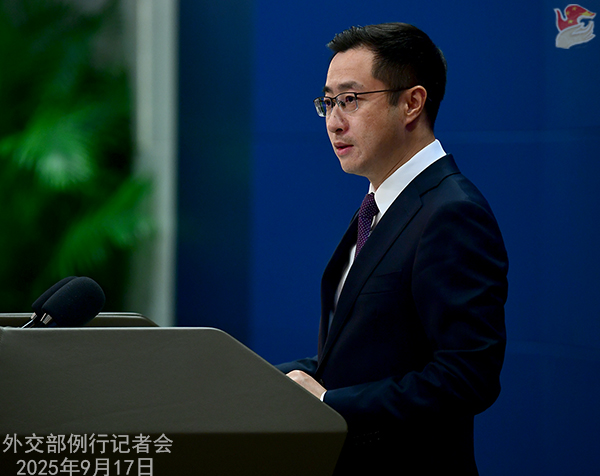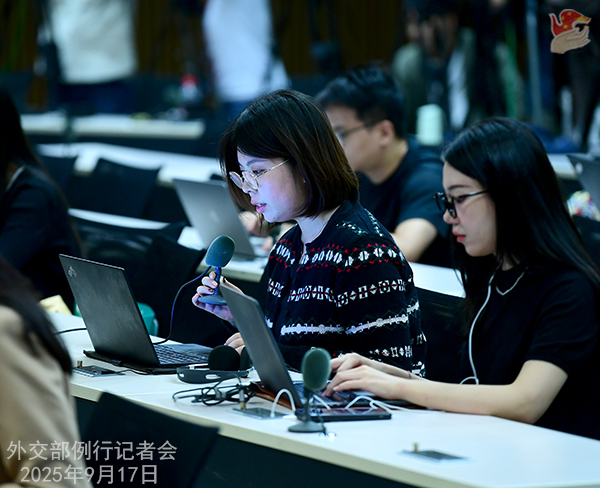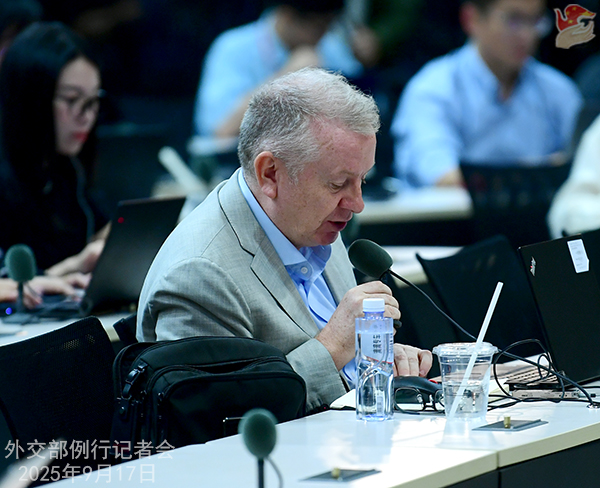
People’s Republic of China


At the invitation of Member of the Political Bureau of the CPC Central Committee and Minister of Foreign Affairs Wang Yi, Foreign Minister of Morocco Nasser Bourita will visit China from September 19 to 20.
AFP: U.S. President Donald Trump on Tuesday extended a delay on enforcing a ban against TikTok until December 16. What is the Chinese Foreign Ministry’s comment on this? Can you provide any more details about the call happening between Trump and Chinese leader and your expectations for it?
Lin Jian: On your question concerning China-U.S. high-level interactions, let me stress that heads-of-state diplomacy plays an irreplaceable role in providing strategic guidance for China-U.S. relations. I do not have information to offer at the moment on your specific question. On your question concerning TikTok, competent Chinese authorities have released relevant information.
People’s Daily: A latest article in the Economist says that China’s export kept surging this year and the country is trading with more diversified partners. The article noted China is cementing its role in supply chains and the world is snapping up more Chinese goods than ever before. The trade war and tariff war posed little influence on China. For trade, fortresses are rarely signs of confidence. In building its own walls, America risks sapping its own vitality. What’s your comment?
Lin Jian: Despite the complex and fluid external environment, China’s foreign trade has maintained steady growth with stronger resilience and vitality. In the first eight months of this year, China’s total trade in goods went up by 3.5 percent year-on-year. ASEAN and the EU have become China’s top two trading partners. China’s total imports and exports with BRI partner countries grew by 5.4 percent.
Building walls and barriers will eventually box oneself in. Removing them and clearing paths leads to win-win. What has happened shows that tariff war and trade war do not change China’s comparative advantages long acquired by its manufacturing sector, nor do they change the global popularity of China’s high-quality goods or reverse the trend of countries supporting trade liberalization and facilitation. Together with the world, China will stay committed to open development, promote an open world economy, reject all forms of protectionism, and share opportunities and thrive together through high-standard opening up.
CCTV: It was reported that the American Institute in Taiwan (AIT) claimed that the Cairo Declaration and the Potsdam Proclamation and other documents “did not determine Taiwan’s ultimate political status.” A U.S. State Department spokesperson said when asked to comment that the AIT comments accurately conveyed the U.S.’ stance and that the Chinese mainland “distorted” the WWII-era documents to support its “coercive” actions against Taiwan, and that none of these documents decided the “ultimate political status” of Taiwan. What’s the Foreign Ministry’s comment?
Lin Jian: I responded to similar questions earlier this week. The restoration of Taiwan to China is an important part of the outcomes of WWII victory and post-war international order. The Cairo Declaration issued by China, the U.S. and the UK in 1943 stipulates clearly that all the territories Japan has stolen from the Chinese, such as Taiwan, shall be restored to China. The Potsdam Proclamation jointly published by China, the U.S., the UK and the Soviet Union in 1945 stipulates that the terms of the Cairo Declaration shall be carried out. In the same year, Japan signed the Japanese Instrument of Surrender, pledging to carry out the provisions of the Potsdam Declaration in good faith. These instruments with legal effect under international law have all clearly affirmed China’s sovereignty over Taiwan.
Taiwan is China’s Taiwan. As a signatory to the Cairo Declaration and the Potsdam Proclamation, the U.S. is fully aware of the historical and legal fact that Taiwan is part of China. Yet the U.S. blatantly rehashes the fallacy that Taiwan’s status is “undetermined” and smears China’s legitimate actions to safeguard national sovereignty and territorial integrity to deliberately mislead international public opinion. What the U.S. has done severely violates international law and the basic norms in international relations and sends a gravely wrong signal to the “Taiwan independence” separatist forces.
History should not be distorted. The one-China principle is a prevailing consensus of the international community. The U.S.’s unilateral distorted interpretation will not shake the international community’s overwhelming commitment to the one-China principle. China urges the U.S. to earnestly abide by the one-China principle and the three China-U.S. joint communiqués, stop manipulating the Taiwan question, stop abetting and aiding “Taiwan independence” in any form and stop interfering in China’s internal affairs. No individual or force can ever hold back China from being reunified.

AFP: Top Hollywood studios including Disney and Universal Pictures in the U.S. on Monday filed a federal lawsuit against Chinese artificial intelligence company MiniMax alleging massive copyright infringement. Does the Foreign Ministry have a comment on this?
Lin Jian: I’m not familiar with what you mentioned. I’d refer you to competent authorities for anything specific. China attaches great importance to the protection of intellectual property rights, and fulfills our international obligations in accordance with laws and regulations.
Bloomberg: Australia and Papua New Guinea have agreed to a new security pact. This is seen as strengthening Canberra’s push to curb China’s influence in the region. Does the Foreign Ministry have an opinion on the agreement and does China see Australia’s attempts to sign security deals with Pacific nations as a threat to regional peace and security?
Lin Jian: Pacific Island Countries (PICs) including Papua New Guinea face top challenges of tackling climate change and accelerating development. China welcomes closer cooperation between PICs and other countries. We actively help PICs grow the economy and deliver better lives for their people. That being said, we believe that cooperation between PICs and any country should put the independence and development of PICs first, uphold openness and inclusiveness, and not target any third party.
AFP: China’s embassy in New Zealand said that a Chinese citizen when transiting at a New Zealand airport was subjected to harassment and interrogation without cause. The Chinese embassy said that it has complained to New Zealand’s Foreign Ministry. Does the Chinese Foreign Ministry have any further comment on this?
Lin Jian: We urge relevant agencies in New Zealand to earnestly respect and safeguard the lawful rights and interests of Chinese nationals. Our embassy in New Zealand will provide necessary consular assistance.
Bloomberg: A K-pop concert in China has been indefinitely postponed. This refers to the so-called “Dream Concert” which was scheduled to take place in Hainan island. It follows another cancellation by a Korean girl group called Kep1er. And these two incidents taken together are seen perhaps some evidence of the hurdles of reopening the Chinese market to South Korean entertainment. Can the Chinese Foreign Ministry comment on these recent events whereby K-pop concerts have been either postponed or canceled?
Lin Jian: I’m not familiar with the specifics you mentioned. We do not object to beneficial cultural exchanges between China and the ROK.
Global Times: It was reported that U.S. Secretary of State Marco Rubio said in Israel on September 15 that Israel has the support of the U.S. over plans to destroy Hamas. On September 16, the Israeli military launched ground offensive and large-scale airstrikes on the Gaza City. The IDF believes around 40 percent of Gaza’s population have so far left. A UN independent international commission of inquiry said that Israel has committed genocide against Palestinians in the Gaza Strip. What is China’s comment?
Lin Jian: China firmly opposes Israel escalating its military operations in Gaza and condemns all moves that harm civilians and violate international law. China is deeply concerned over further escalation of tensions, and opposed to relevant party fueling the flames. We urge Israel to listen to the strong concerns voiced by the international community, stop its military operations in Gaza at once, realize a full and lasting ceasefire as soon as possible, and avoid an even larger humanitarian crisis. We hope relevant parties will act in the interest of regional peace and stability, uphold a just position and responsible attitude, and play a constructive role for deescalating the situation.




